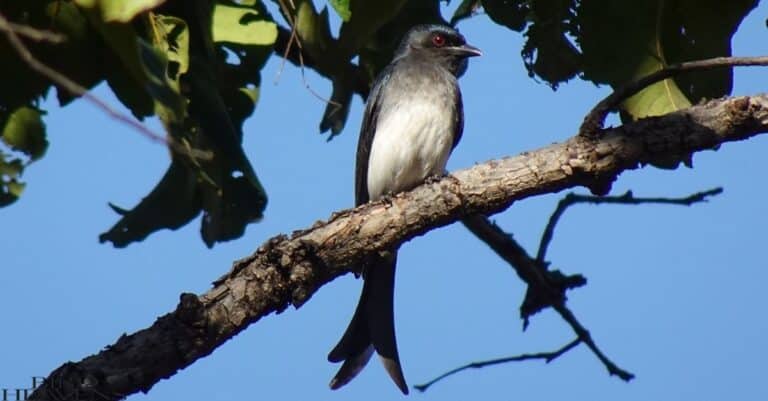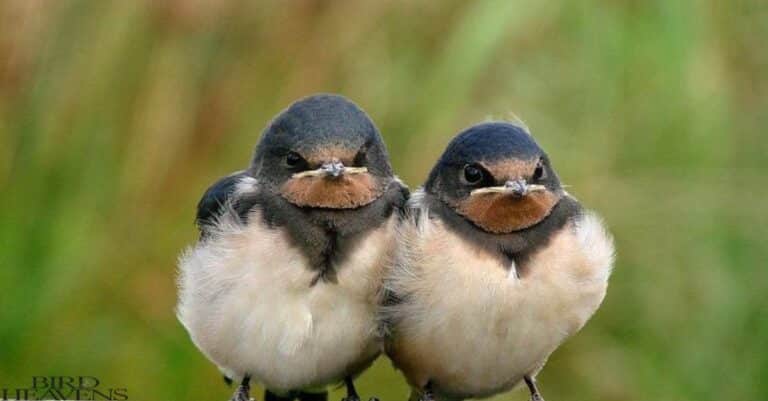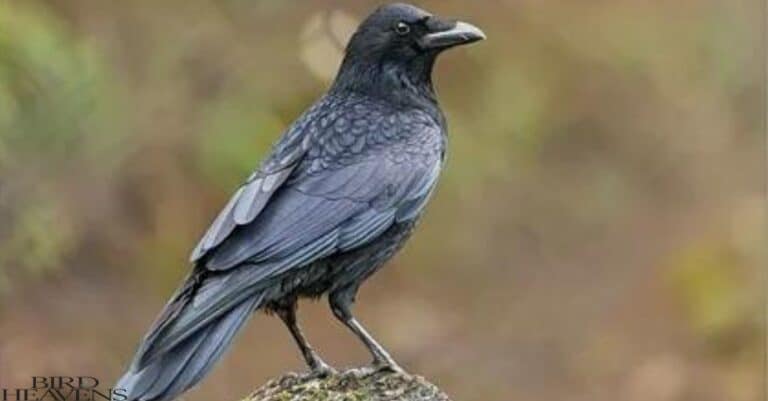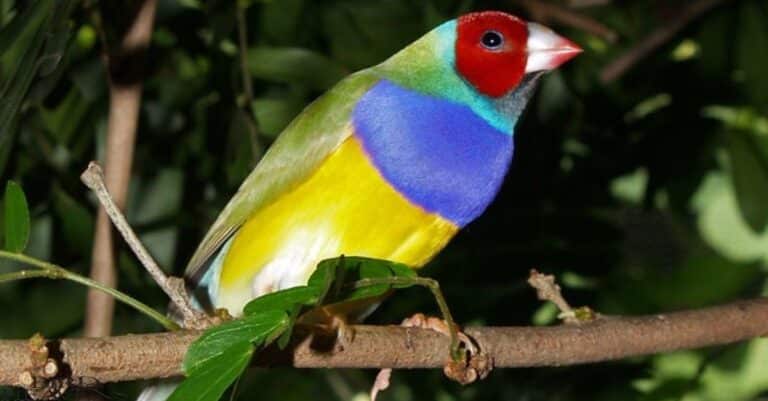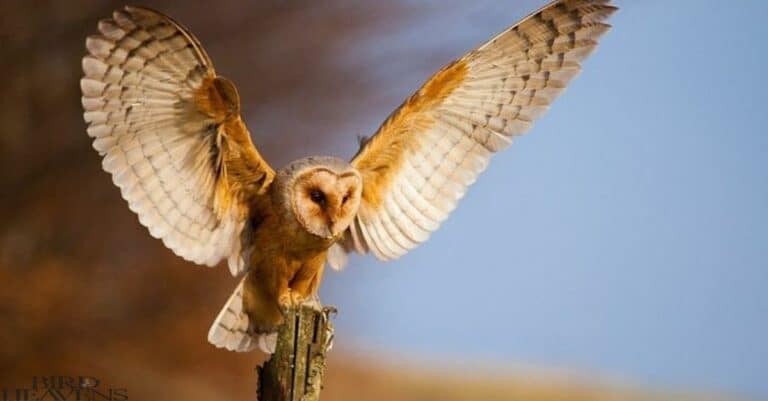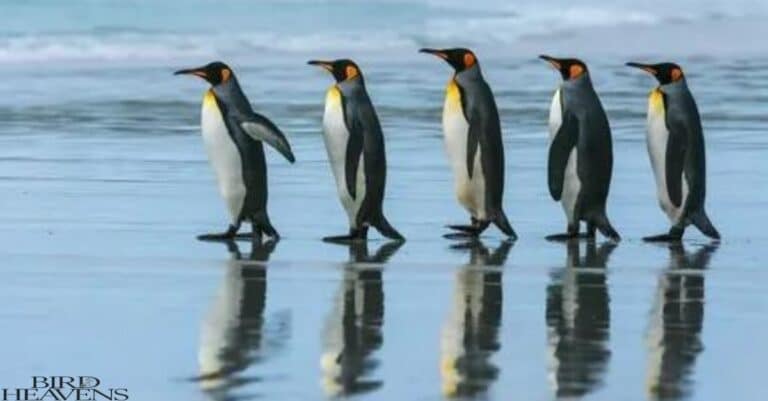Do Vultures Attack Humans? Here’s What You Need To Know
Vultures do not typically attack humans. These birds of prey are scavengers, not predators, and naturally avoid human contact.
While there have been rare instances of vultures approaching people, usually due to food scarcity or habituation, actual attacks are extremely uncommon.
Vultures play a crucial role in ecosystems as nature’s clean-up crew, and fears of them attacking humans are largely unfounded.
Do Vultures Attack Humans?
Vultures, both Old World and New World species, are essential scavengers in ecosystems worldwide. They primarily feed on carrion and rarely attack live animals or humans.
While some species like black vultures may occasionally show interest in livestock, vultures generally avoid human contact. These birds possess unique adaptations, including keen eyesight and an astonishing sense of smell, which help them locate food.
Let’s dive into the fascinating world of these scavenger birds and separate fact from fiction.
Vulture Basics: Know Your Scavengers
Before we delve into vulture behavior towards humans, it’s crucial to understand the basics of these fascinating birds.
Types of Vultures
Vultures are broadly categorized into two groups:
- Old World Vultures: Found in Africa, Europe, and Asia
- New World Vultures: Native to the Americas
| Old World Vultures | New World Vultures |
| Use sight to find food | Use smell to find food |
| Related to eagles and hawks | More closely related to storks |
| Examples: Griffon Vulture, Egyptian Vulture | Examples: Turkey Vulture, Black Vulture |
Do Vultures Actually Attack Humans?
No, vultures do not typically attack humans. In fact, documented cases of vultures attacking people are extremely rare. These birds are naturally wary of humans and prefer to keep their distance.
Documented Cases:
While there have been a few reported incidents of vultures approaching humans, these are usually due to exceptional circumstances:
- Extreme food scarcity: In areas where food is scarce, vultures might become bolder in their search for sustenance.
- Habituation to human presence: In some urban or tourist areas, vultures may lose their fear of humans if frequently fed.
- Defensive behavior: If a vulture feels threatened or cornered, it may display aggressive behavior as a last resort.
Real Life Case Study:
In 2013, a hiker in California reported being “attacked” by a turkey vulture. Upon investigation, it was found that the bird was likely defending a nearby nest and the encounter was more of a warning display than an actual attack.
Are Vultures Aggressive?
Vultures are not inherently aggressive birds. Their natural temperament is cautious and non-confrontational. However, like any wild animal, they may display defensive behaviors if they feel threatened.
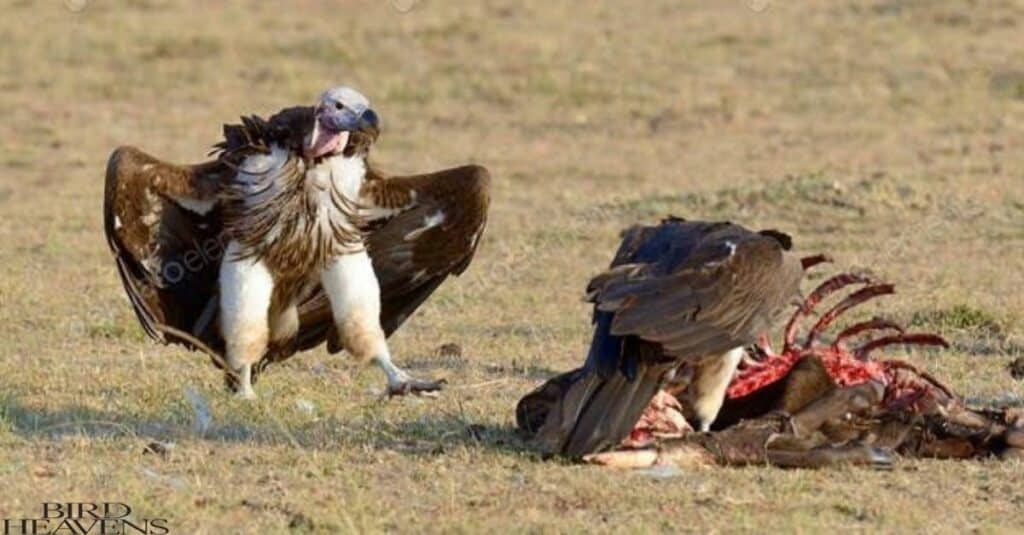
Natural Temperament:
Vultures are generally:
- Calm and docile
- Non-territorial (except during breeding season)
- Prefer to avoid confrontation
Defensive Behaviors:
When threatened, vultures might:
- Hiss or grunt
- Spread their wings to appear larger
- Regurgitate (as a last resort to deter predators)
You Might Like >>29 Yellow Birds In Ohio
Do Vultures Eat Humans?
The idea of vultures eating humans is largely a myth perpetuated by popular culture. Vultures are scavengers, not predators, and they don’t actively hunt humans or any large live animals.
Scavenging vs. Predation:
- Scavenging: Vultures feed on already dead animals
- Predation: Actively hunting and killing live prey (not typical vulture behavior)
Vultures’ Role in Decomposition:
Vultures play a crucial role in ecosystems by:
- Disposing of carcasses quickly
- Preventing the spread of diseases
- Recycling nutrients back into the environment
Do Vultures Eat Live Animals?
While vultures primarily feed on carrion, there are some exceptions to this rule.
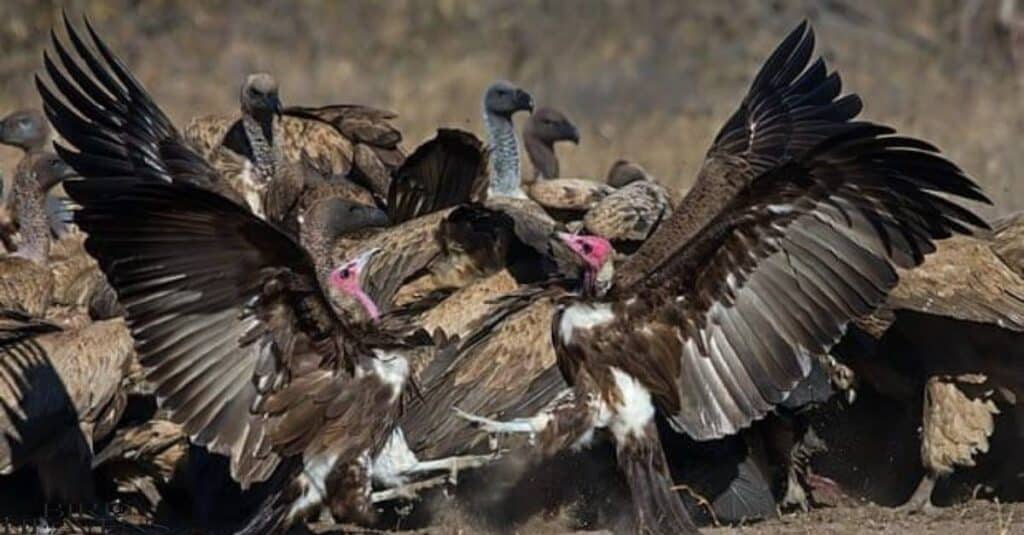
Exceptions to the Scavenging Rule:
Some vulture species, particularly black vultures, have been known to occasionally prey on:
- Newborn livestock
- Weakened or sick animals
- Small reptiles or amphibians
Fact: Black vultures in Texas have been reported to occasionally attack newborn calves, leading to conflicts with ranchers.
Do Vultures Attack Dogs or Pets?
While extremely rare, there have been isolated reports of vultures, particularly black vultures, showing interest in pets or livestock.
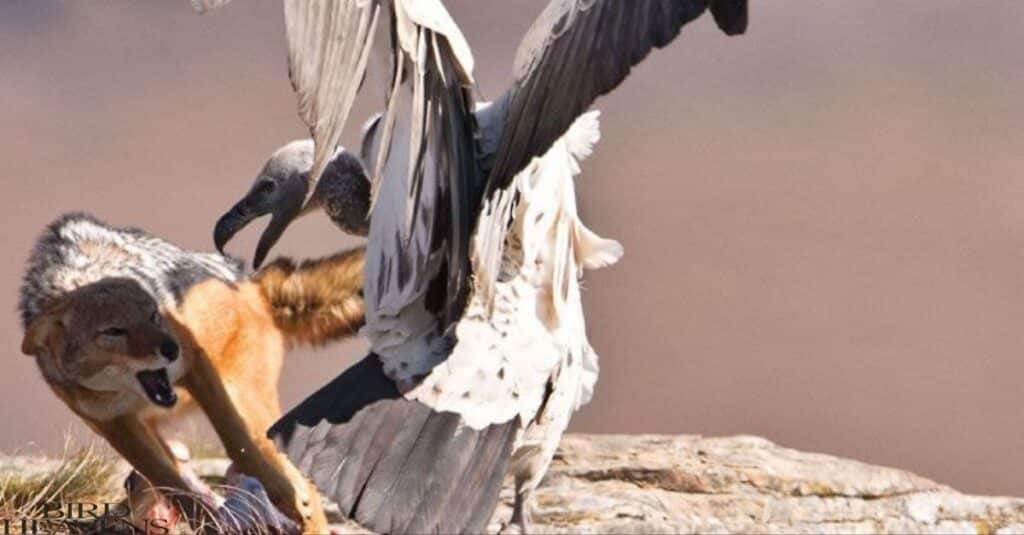
Rare Instances and Contributing Factors:
Factors that might lead to vulture-pet interactions include:
- Food scarcity
- Mistaking small pets for typical prey
- Defensive behavior if pets approach vulture nesting sites
Protecting Pets in Vulture-Rich Areas:
To minimize risks:
- Keep small pets supervised outdoors
- Secure outdoor pet food
- Avoid leaving pet waste in your yard
You Might Like >>Do Crows Eat Other Birds? The Disturbing Truth
Are Vultures Dangerous to Humans?
While vultures don’t pose a direct threat to humans, there are some safety considerations to keep in mind.
Disease Transmission Risks:
Vultures can potentially carry diseases due to their diet of carrion. However, transmission to humans is extremely rare and usually only a concern for people who handle vultures or their carcasses regularly.
Proper Handling and Avoidance Techniques:
If you encounter a vulture:
- Maintain a respectful distance
- Do not attempt to feed or touch the bird
- If you must handle a vulture (e.g., for research or rescue), wear protective gear
Are Black Vultures Dangerous?
Black vultures are sometimes considered more aggressive than other vulture species. They’re more likely to:
- Approach human settlements
- Show interest in live animals
- Display bolder behavior around humans
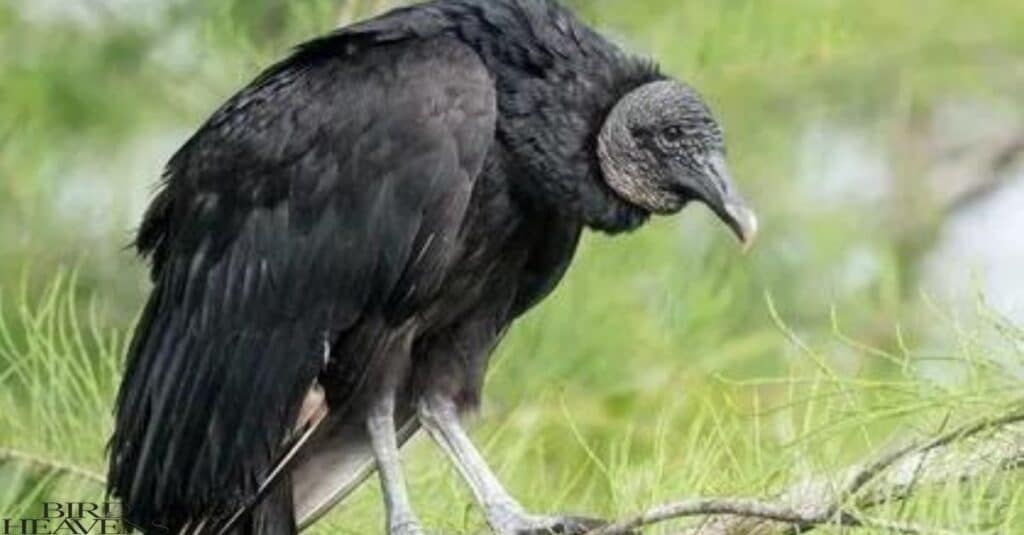
Are Turkey Vultures Dangerous?
Turkey vultures are generally more timid and less likely to cause conflicts with humans. They:
- Prefer to keep their distance from people
- Rarely show interest in live animals
- Are less likely to approach urban areas
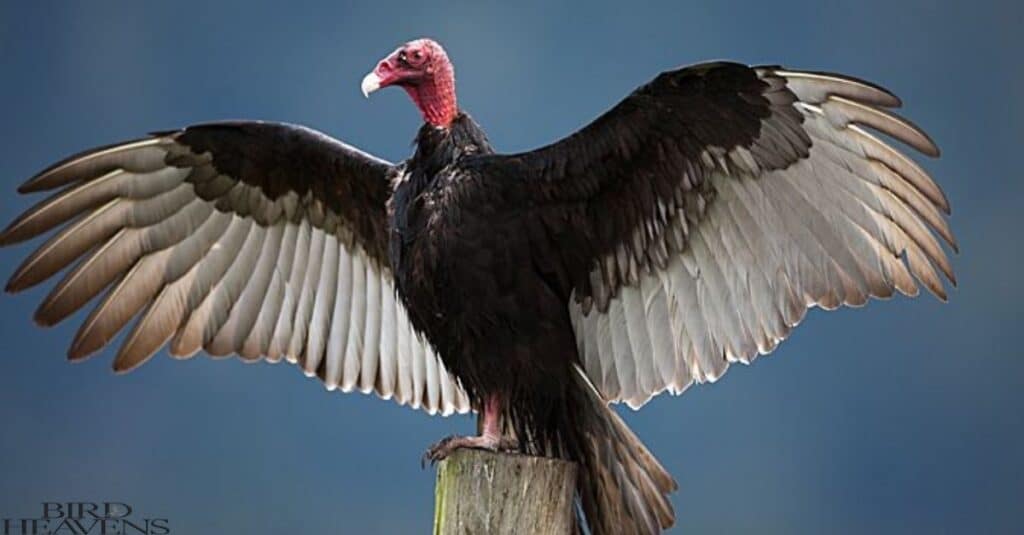
Difference between a black vulture and a turkey vulture?
| Feature | Black Vulture | Turkey Vulture |
| Head color | Black | Red |
| Wing shape | Shorter, broader | Longer, more slender |
| Flight pattern | More flapping | More soaring |
| Tail shape | Short and square | Longer and rounded |
Vultures’ Natural Caution Around Humans
Vultures are generally shy and cautious around humans. They’ve evolved to be scavengers, not predators, and their instinct is to flee rather than confront potential threats.
This behavior is crucial for their survival, as it helps them avoid dangerous situations.
Circumstances That Might Lead to Close Vulture-Human Encounters:
While vultures typically avoid humans, there are situations where close encounters might occur:
- Feeding sites: Areas where people regularly dispose of animal carcasses might attract vultures.
- Nesting areas: During breeding season, vultures may be more defensive near their nests.
- Urban expansion: As human settlements encroach on vulture habitats, encounters may become more frequent.
You Might Like >>How and Where Do Geese Sleep?
Vulture Conservation and Human Coexistence
Importance of Vultures in Ecosystems:
Vultures are crucial for maintaining healthy ecosystems. They:
- Prevent disease spread by quickly consuming carcasses
- Recycle nutrients back into the environment
- Indicate environmental health (vultures are sensitive to ecological changes)
Threats to Vulture Populations:
Vulture populations worldwide have lost substantial numbers due to various threats:
- Habitat loss
- Poisoning (both intentional and unintentional)
- Collision with artificial structures
- Hunting and persecution
How Humans Can Safely Coexist with Vultures:
To promote healthy coexistence:
- Educate yourself and others about vultures’ ecological importance
- Support vulture conservation efforts
- Properly dispose of waste to avoid attracting vultures to urban areas
- Respect vulture habitats and nesting sites
Vultures are nature’s most efficient clean-up crew. Their unique digestive systems allow them to consume and effectively neutralize dangerous pathogens found in decaying flesh.
Without vultures, we’d see a dramatic increase in the spread of diseases from rotting carcasses. It’s crucial that we dispel myths about vulture aggression and recognize their invaluable role in maintaining ecological and public health._Dr. Mark Thompson
Regional Vulture Species and Their Behaviors
Vultures in Texas:
Texas is home to both black vultures and turkey vultures. These scavenger birds play a crucial role in the state’s diverse ecosystems.
- Black Vultures: More common in urban areas, sometimes causing conflicts with livestock farmers
- Turkey Vultures: Widely distributed across Texas, often seen soaring along highways
Winter Birds in Michigan:
While not typically associated with cold climates, turkey vultures are among the winter birds in Michigan. They usually migrate south for the winter, but some may stay year-round in urban areas where food is more readily available.
Vultures vs. Other Birds of Prey
It’s important to distinguish vultures from other raptors like hawks and eagles. While all are birds of prey, their behaviors and diets differ significantly.
| Characteristic | Vultures | Hawks | Eagles |
| Primary Food Source | Carrion | Live prey | Live prey, some scavenging |
| Hunting Method | Scavenging | Active hunting | Active hunting |
| Foot Structure | Weaker, not adapted for killing | Strong talons for catching prey | Powerful talons for catching large prey |
The Vulture’s Astonishingly Good Sense of Smell
One of the most remarkable features of vultures, particularly New World species like the turkey vulture, is their astonishingly good sense of smell. This ability sets them apart from many other birds and is crucial to their scavenging lifestyle.
- Turkey vultures can detect carrion from over a mile away
- They can smell gases produced by the early stages of decay
- This ability allows them to find food hidden under forest canopies
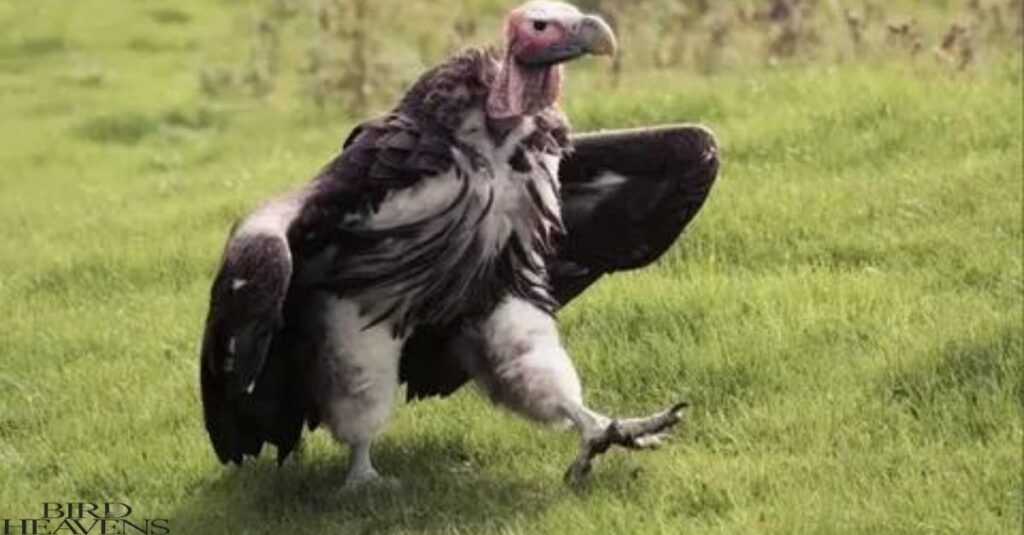
The Practice of Giving Dead Bodies to Vultures
In some cultures, particularly in Tibet and parts of India, there’s a funeral practice known as “sky burial” where dead bodies to vultures are given as part of a ritual.
- This practice is based on the belief in returning the deceased to nature
- It’s also practical in areas where the ground is too hard for traditional burial
- Vultures can completely consume a human body in a matter of hours
While this practice might seem shocking to some, it underscores the important role vultures play in many ecosystems and cultures.
You Might Like >>Finches In Florida
Vultures’ Impact on Agriculture and Livestock
While vultures primarily feed on carrion, there have been instances of vultures eating live animals, particularly reported cases of black vultures attacking newborn or weak livestock.
Protecting Livestock from Vultures:
Farmers and ranchers in areas with high vulture populations can take steps to protect their animals:
- Provide shelter for vulnerable animals, especially during birthing seasons
- Use visual deterrents like reflective tape or predator effigies
- Properly dispose of stillborn animals or afterbirth to avoid attracting vultures
Vultures in Urban Environments
As human settlements expand, vultures are increasingly adapting to urban environments. This can lead to both challenges and opportunities for human-vulture coexistence.
Benefits of Urban Vultures:
- Natural waste management, cleaning up roadkill and other animal remains
- Indicator of environmental health
- Opportunity for urban wildlife education and appreciation
Challenges of Urban Vultures:
- Potential conflicts with pets or small livestock
- Damage to property (vultures’ acidic droppings can corrode metal and paint)
- Public misconceptions and fear
Case Study:
Researcher Dr. Emily Rodriguez’s
Dr. Emily Rodriguez, an ornithologist at the University of Texas, conducted a two-year study on black vulture behavior in Austin, Texas. Her research, published in the Journal of Urban Ecology in 2022, found that urban black vultures showed significantly different behavior patterns compared to their rural counterparts.
Key findings:
- Urban vultures were more tolerant of human presence, often scavenging within 50 meters of busy areas.
- They displayed a 30% increase in daytime activity compared to rural vultures.
- Despite increased human proximity, no aggressive interactions with humans were recorded during the study period.
Vulture Behavior and Climate Change
Climate change is affecting vulture populations and behaviors worldwide. Some observed and potential impacts include:
- Changes in migration patterns
- Shifts in breeding seasons
- Alterations in food availability and distribution
Understanding these changes is crucial for ongoing vulture conservation efforts.
Conclusion:
In conclusion, the fear of vultures attacking humans is largely unfounded. These remarkable birds are nature’s clean-up crew, playing a vital role in our ecosystems. While they may look intimidating, vultures are generally shy, non-aggressive creatures that prefer to avoid human contact.
By debunking myths and promoting accurate information, we can foster a greater respect for vultures and their important place in our world.
FAQs :
Quick recap of what we’ve learned:
- Do vultures attack humans? No, vultures do not typically attack humans. They are scavengers, not predators.
- Are vultures dangerous? Vultures are not generally dangerous to humans. They prefer to avoid human contact.
- Do vultures eat humans? Vultures may consume human remains in some cultural practices, but they do not hunt or eat living humans.
- Are vultures aggressive? Vultures are not inherently aggressive. They may display defensive behaviors if threatened, but generally avoid confrontation.
- Do vultures attack dogs or pets? Vulture attacks on pets are extremely rare. Black vultures might occasionally show interest in small or weak animals.
- Are black vultures dangerous? Black vultures can be bolder than other species, but they’re not typically dangerous to humans.
- Are turkey vultures dangerous? Turkey vultures are generally timid and pose little risk to humans or pets.
- Do vultures eat live animals? Vultures primarily eat carrion, but some species may occasionally prey on weak or newborn animals.
- Do vultures pose a threat to small children or pets? While vultures do not typically pose a threat to children or pets, it’s always wise to supervise young children and small pets outdoors, especially in areas with known vulture populations. Vultures are not predators and are unlikely to attack, but their large size might be intimidating to a child or small animal.
- Can vultures transmit diseases to humans?While vultures can carry bacteria and other pathogens from the carcasses they eat, the risk of disease transmission to humans is very low.Vultures have incredibly strong immune systems and stomach acid that kill most harmful bacteria. However, it’s always best to avoid direct contact with vultures or their droppings.

Andrew Paul is a renowned ornithologist and founder of Bird Heavens. With my extensive expertise in bird behavior and habitat preservation,I will insightful content on species identification and conservation.My Future plans include interactive workshops and online courses to foster a global community of bird enthusiasts committed to conservation and appreciating avian life. Join me at Bird Heavens


